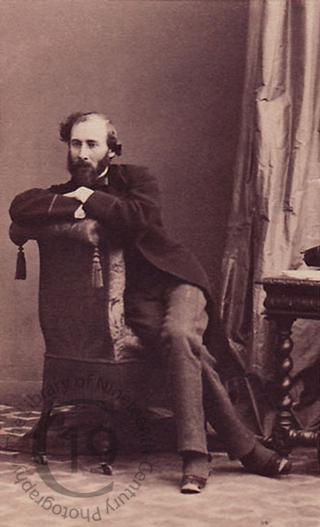
Octave Feuillet
A carte-de-visite portrait of the French author and playwright Octave Feuillet (1821-1890).
Feuillet’s mother died during his infancy and he was brought up by his learned but neurotic father, a hypersensitive invalid who suffered from a nervous excitability that Octave eventually inherited. Originally destined for the diplomatic service, in 1840 Octave announced his intention to follow literature, was immediately cut off by his father and forced to earn a scanty living by journalism in Paris. He began to write for the stage with Paul Bocage, and met with a little success. Three years later he was reconciled with his father. Now enjoying a liberal allowance, he was able to live in comfort and publish his early novels. However, his father’s health declined and he was recalled to the melancholy family home to bury himself in constant attendance on his tyrannical father, bound by filial duty to a mournful captivity. In 1851 he married his cousin, Valerie Feuillet, who helped him to endure his exile. His period of greatest literary success followed. His first definite success was in 1852, with the publication of the novel Bellak, reprinted from the Revue des Deux Mondes, where many of his later works also first appeared. Further successes followed: La Petite Comptesse (1857), Dalila (1857) and in particular, Le Roman d’un Jeune Homme Pauvre (1858).
In 1857 he turned his novel Dalila into a play. Performed at the Vaudeville, it was a brilliant success. The following year, he repeated his triumph with an adaptation of Un Jeune Homme Pauvre. It was during one of Octave’s brief visits to Paris for rehearsals of this piece that his father died. Freed from his father’s mania for solitude, Octave and his family immediately moved to Paris and joined the social scene of the Second Empire. The elegant and distinguished novelist became a favourite at court, and his plays were performed at Compiègne before they were seen by the general public, on one occasion the Empress Eugénie herself taking the part of Madame de Pons in Les Portraits de la Marquise. In 1862 his novel Sibylle met with enormous success. His health, however, had by this time begun to deteriorate and he decided to leave Paris for the peace of Normandy. The family chateau had been sold, but he bought a house called Les Paillers where he lived, absorbed in his rose garden, for the next fifteen years. He was elected to the French Academy in 1862, and in 1868 he was appointed librarian of Fontainebleau, where he had to reside for one or two months a year. In 1867 he produced his masterpiece, Monsieur de Camors, and in 1872 he wrote Julia de Trécoeur. His last years were spent in ceaseless wandering, the result of the agitation of his nerves. He was broken by sorrow and by ill-health, and his death in Paris on 29 December 1890 was a release.
Photographed by Disdéri of Paris.
Code: 124329




